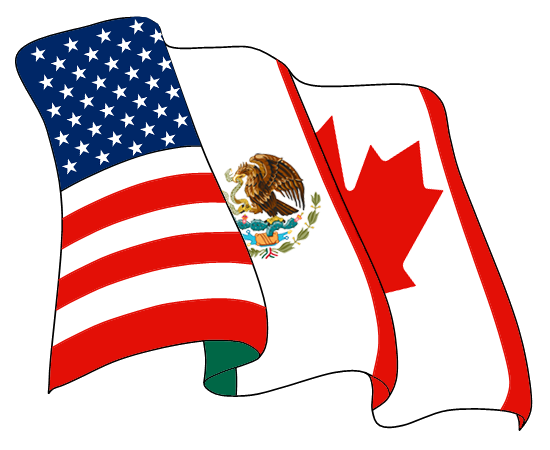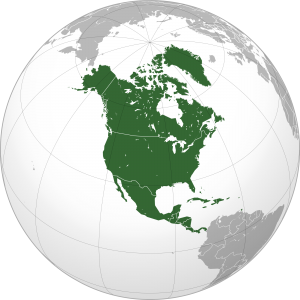Mend NAFTA but don’t end it

Analysis and Commentary By: Victor Martino
 President Trump got substantial support from California’s farmers and agribusiness industry during the 2016 Presidential campaign, despite the fact he advocated scrapping the North America Free Trade Agreement (NAFTA), which is supported overwhelmingly by the farming and agribusiness sectors here in the Golden State and nationally.
President Trump got substantial support from California’s farmers and agribusiness industry during the 2016 Presidential campaign, despite the fact he advocated scrapping the North America Free Trade Agreement (NAFTA), which is supported overwhelmingly by the farming and agribusiness sectors here in the Golden State and nationally.
The good news for California Ag is that President Trump decided to take a different position on NAFTA than candidate Trump did, once he was elected and started to get an earful about the free trade agreement from America’s food and farm lobby, along with the farmers in California and elsewhere who comprised an important part of the coalition that helped get him elected.

Trump’s choice for Secretary of Agriculture, Sonny Perdue, a farmer himself, also played a key role in convincing the President that the route to take with NAFTA is to mend it rather than end it,
which is where we are today – in the middle of negotiation – with the historic trade agreement between the U.S. and our two next door neighbors, Mexico and Canada.
The mending, as well as the overall NAFTA trade negotiations, which resumed on February 25 in Mexico, aren’t going very well. To use a word favored by trade negotiators — things are “difficult.”
How difficult? Basically the three countries agree on little to nothing when it comes to overhauling NAFTA.
Each country is more concerned with what it sees as how NAFTA is wounding its respective economy, so the sense of collective negotiation and compromise required to strike a deal appears to be far off, as the new round of talks, which run until March 5, resume.

“It’s going to be a difficult meeting, because the more you advance in the negotiations and wrap up work on the constructive issues… what you’re left with are the highly complex issues,” Mexico’s Economy Minister Ildefonso
Guajardo told journalists at a press conference in advance of the start of the new round of negotiations in Mexico on February 25.
U.S. trade represenative Robert Lighthizer told the New York Times in its Saturday, February 24 edition that because of the complexity of the issues, finding agreement in this round of talks is very important.
“The uncertainty looming over the deal [NAFTA] is only increasing as the clock ticks on,” Lighthizer, the U.S negotiator says.
Also looming over the negotiations is President Trump, who often comments that he still hasn’t ruled out scrapping NAFTA altogether and pulling out of the trade agreement if Canada and Mexico don’t gain a better understanding of and cooperate more on what he says are abuses of the U.S. by the trading partners.
NAFTA is institutionalized
The reality though is it’s near-impossible to scrap NAFTA. First, if the President and Congress were to do so, lawsuits would be filed, which would hold-up for years any changes to the status quo of the free trade agreement.
From a practical business standpoint trying to put the NAFTA genie back in the bottle would create serious economic damage to farmers, agribusinesses and the entire food industry.
Under NAFTA rules, important cross-border food supply chains have developed, and significant cross-border investments have been made by the three NAFTA member-countries, along with by food and ag corporations in the three nations.
Big agribusiness and food companies like PepsiCo (U.S-headquartered), Saputo (Canada) and Grupo Bimbo (Mexico) have acquired companies -PepsiCo owns a number of Mexico’s leading food brands, such as Gamesa, and Grupo Bimbo owns three or four of the major bread brands on U.S. grocery store shelves, for example – do business in all three countries in a seamless way post-NAFTA. The cross-border economic activity is too big to scrap. The results would be economically devastating.
Therefore, mending and not ending NAFTA is the only way that will preserve the gains made under it and potentially lead to the best deal possible for all three member- countries. It’s the only real roadmap.
In the increasingly global world we live in, trade agreements are essential, whether we like it or not. Why? Because trade agreements, among other things, determine the taxes and duties, called tariffs, imposed on products coming into a country
Trade agreements also set rules and conventions for behavior, and they allow for predictability. These are two essential conditions required to do business globally.
NAFTA was historic, according to former Obama Administration Agriculture Secretary and Iowa Governor Tom Vilsack, who’s now CEO of the U.S. Dairy Export Council, an industry group, because it removed tariff barriers, opening doors between the United States, Mexico and Canada.
According to USDA, total U.S. ag exports to Mexico and Canada under NAFTA reached a whopping $43 billion in 2016. 2017 data isn’t in yet. To put this in perspective, USDA says total U.S. ag exports to the entire world are expected to be around $140 billion for 2018.
That two small countries, Canada and Mexico, can comprise such a high percentage, $40 billion, of the total $140 billion would not have happened without NAFTA and its elimination of tariffs between the U.S., Canada and Mexico.
Mending NAFTA
Russell Hillberry, an associate professor of agricultural economics at Perdue University in Indiana, has done serious work on how NAFTA can be mended. In a recent review paper Hillberry authored, which is getting considerable attention from trade experts, he asks this rhetorical question, “What would a productive renegotiation of NAFTA look like?” His answer includes these four key issues:

1. Reduce or eliminate non-tariff barriers to U.S. agricultural imports, including those affecting new U.S. technologies.
2. Maintain commitments to eliminate export subsidies (while also preserving food aid and export development programs).
3. Seek robust rules governing sanitary and phytosanitary (SPS) provisions that are sometimes used to limit imports of Ag and food products, and
4. Strengthen ongoing cooperation between the agencies that oversee SPS rules in the NAFTA member countries.
There are others of course. But he sets the table with these four.
Hillberry believes a framework like this, if used by U.S. trade negotiators, could result in an agreement with Mexico and Canada, although he stresses that it will be difficult. Notice how “difficult” keeps coming up in regard to NAFTA and the current round of negotiations.
The California giant
The California Farm Bureau and every other association representing farmers and the state’s agribusiness and food industries, is strongly in favor of NAFTA.
Corn, pork, soybeans and poultry are the top four crops the U.S. exports to Mexico and Canada under NAFTA, according to USDA.
Dairy is the fastest-growing category percentage-wise, seeing an increase of 885% to $1.2 billion in 2016 with NAFTA, according to USDA. Prior to NAFTA, U.S. dairy exports were near-nonexistent. The majority is exported in powder form.
Fresh market produce trade has also increased between the three countries with NAFTA, the major beneficiary being Mexico, which has become a colossal fresh produce exporter to the U.S. under NAFTA.
The California dairy and poultry industries have the most potential to benefit from NAFTA, since most corn grown in California isn’t exported, soybeans aren’t a major crop, and the few hogs that are raised for market are for domestic sales.
But trade agreements like NAFTA are dynamic and forward-looking. Imagine the opportunity, for example, if the California almond industry could convince Mexicans to buy and eat almonds from California like Mexico has convinced American consumers to do through its hugely-successful ‘Avocados From Mexico’ marketing and advertising program.
During the first 20 years of NAFTA, trade between the U.S., Mexico and Canada tripled. Much of those dollars were agriculturally-based.
It’s too late to put the NAFTA genie back in the bottle, which is why California’s massive food and agriculture industry – from farmers to grocers – supports mending but not ending the free trade agreement.
Right now things look at best hopefull that the U.S., Canada and Mexico will strike a deal. And the U.S. President has made it clear he is still keeping his “Trump Card” – scrapping NAFTA – in his hip pocket if negotiations go south.
California farmers and the state’s agribusiness industry have real skin in the game. Therefore it’s imperative we speak up and be heard, because unlike most farm regions in the U.S., California’s crop diversity and status as a global ag powerhouse means we have unique demands and needs – like the need for more immigrant farm workers to pick our crops.
Mend NAFTA. But don’t end it.

Victor Martino, Ag Expo Magazine’s new columnist, writer and analyst, is founder and president of San Francisco and Modesto-based Third Wave Strategies, a strategic marketing, business development and communications firm specializing in the food, grocery and ag industries. He’s also a columnist and writer for the global food industry publication just-food, a food industry analyst, and an entrepreneur. Martino was born and raised in the Central Valley. Contact: victormartino415@gmail.com. Twitter: www.twitter.com/nsfoodsmemo
